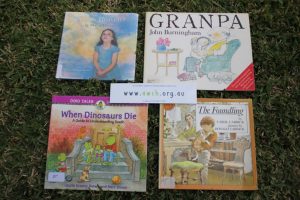Atle Dyregrov
2nd edition, Jessica Kingsley Publishers, London, 2008. ISBN 9781843106128
“Atle Dyregrov has written about children and death with a calm and clear voice”
Explaining death, grief and loss to children and young people can be incredibly challenging especially for grieving parents and carers. Even health professionals, emergency workers, police and teachers working with children find talking about death, grief and loss with kids hard.
This became clear to me when a nurse asked AWCH for information about how to talk to children in her own family about their parent’s serious illness. She wanted to talk with and prepare children at their level and in a supportive way. This was a critical time in their lives.
Grief in children: a handbook for adults, is an accessible book for parents, carers, family and professionals. It is for people who want to prepare, care for and support children living through grief, loss or trauma when someone is dying or has died. Circumstances covered vary from anticipated to sudden and traumatic death.
Children and adolescents at different age levels have different understandings about death and grief. So how do we help children through their grief journey?
Atle Dyregrov has written about children and death with a calm and clear voice. This is valuable in western culture where people often find it difficult to know how to talk about death. This book gives information about children and how they might think about death based on their age, sex and developmental stage. Useful examples have been drawn from family life experiences. In this second edition, more children’s voices are included with children’s questions and reactions. There is also more material on traumatic deaths. Atle Dyregrov has listened to what children have said about what is helpful and supportive.
To view contents link to the book,
Grief in children: a handbook for adults. The chapter
Guidelines for taking care of children’s needs, explores open and direct communication. There is information on death following an illness, making the loss real and giving time for understanding to grow. Children need information, adolescents may want to have websites to look at.
The section Handling death in a playgroup and at school, is an inevitable situation for teachers and this book will help to do this well. Find help with mental preparation and planning before a death or other critical event occurs. Atle Dyregrov includes information on terminal illness of a child, although the general focus of the book is on sudden death.
This handbook overviews crisis or grief therapy for children and bereavement groups for children, caring for oneself and peer support.
Grief in children, draws on the author’s experience as a clinical psychologist, author and director of the Center for Crisis Psychology in Bergen, Norway. His extensive experience and research underpins this book, yet the tone is informative and very readable. The case studies bring experience and understanding to the topic. Concerned adults will find a good overview and helpful information for what can be a hard task involving raw emotions.
For children’s healthcare facilities valuing patient and family centered care, Grief in children will be a good addition to the bookshelf. It is also an accessible reference book for early childhood educators, teachers, school counselors, pastoral carers, libraries and families.
More information
Crisis support
Hey teachers there’s also the Kids helpline @ School program
Resources and links
Australian Centre for Grief and Bereavement
Parent and carer information
Do you have a resource that has been helpful? We’d love to hear from you.










